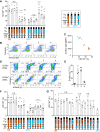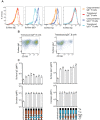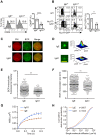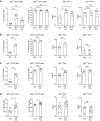Regulation of B cell fate by chronic activity of the IgE B cell receptor
- PMID: 27935477
- PMCID: PMC5207771
- DOI: 10.7554/eLife.21238
Regulation of B cell fate by chronic activity of the IgE B cell receptor
Abstract
IgE can trigger potent allergic responses, yet the mechanisms regulating IgE production are poorly understood. Here we reveal that IgE+ B cells are constrained by chronic activity of the IgE B cell receptor (BCR). In the absence of cognate antigen, the IgE BCR promoted terminal differentiation of B cells into plasma cells (PCs) under cell culture conditions mimicking T cell help. This antigen-independent PC differentiation involved multiple IgE domains and Syk, CD19, BLNK, Btk, and IRF4. Disruption of BCR signaling in mice led to consistently exaggerated IgE+ germinal center (GC) B cell but variably increased PC responses. We were unable to confirm reports that the IgE BCR directly promoted intrinsic apoptosis. Instead, IgE+ GC B cells exhibited poor antigen presentation and prolonged cell cycles, suggesting reduced competition for T cell help. We propose that chronic BCR activity and access to T cell help play critical roles in regulating IgE responses.
Keywords: B cell receptor; T cell help; antigen presentation; cell biology; germinal center; immunology; mouse; plasma cell; signaling.
Conflict of interest statement
The authors declare that no competing interests exist.
Figures













References
-
- Anand S, Batista FD, Tkach T, Efremov DG, Burrone OR. Multiple transcripts of the murine immunoglobulin epsilon membrane locus are generated by alternative splicing and differential usage of two polyadenylation sites. Molecular Immunology. 1997;34:175–183. doi: 10.1016/S0161-5890(96)00110-1. - DOI - PubMed
Publication types
MeSH terms
Substances
Grants and funding
LinkOut - more resources
Full Text Sources
Other Literature Sources
Molecular Biology Databases
Miscellaneous

